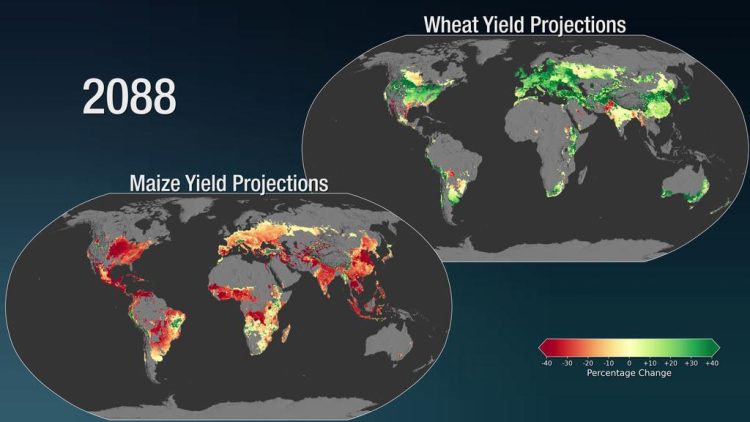As the world heats up faster than a microwave dinner on high, it’s becoming abundantly clear that climate change isn’t just messing with our beach vacations – it’s also wreaking havoc on global agricultural yields. So buckle up, folks, because we’re about to take a wild ride through the twisted, turning rollercoaster that is the impact of climate change on our beloved crops. Get ready for some droughts, floods, and a whole lot of crop circles that definitely weren’t made by aliens. Let’s dig in, shall we
Causes of Declining Agricultural Yields Worldwide
It’s baffling how Mother Nature seems to be on the warpath against our crops! Here are some possible culprits behind the declining agricultural yields worldwide:
1. **Climate Change**: Oh boy, here we go again. Thanks to our love for fossil fuels and unsustainable practices, the Earth is throwing a tantrum. Erratic weather patterns, extreme temperatures, and unpredictable rainfall are wreaking havoc on our precious crops.
2. **Pests and Diseases**: Just when our crops thought they had survived the wrath of climate change, along comes an army of hungry pests and deadly diseases. From voracious locust swarms to sneaky crop-eating fungi, our plants are under siege.
3. **Soil Degradation**: We’ve been treating our soils like garbage dumps for far too long. Overuse of chemicals, deforestation, and poor land management practices have left our soils depleted and exhausted. It’s no wonder our crops are struggling to thrive.
4. **Urbanization and Land Degradation**: As cities expand and concrete jungles take over, fertile agricultural land is being swallowed up faster than you can say “organic kale.” With less land available for farming, it’s no surprise that yields are declining.

Effects of Rising Temperatures on Crop Production
With temperatures on the rise, crop production is facing some interesting challenges. Let’s take a look at some of the effects that farmers are experiencing:
- Decreased yields: As temperatures increase, crops can become stressed and yield less produce than usual. Farmers are having to come up with creative ways to combat this issue, such as implementing shade structures or using heat-tolerant varieties.
- Pest infestations: Rising temperatures are also causing an increase in pest populations, leading to more crop damage. Farmers are resorting to unconventional methods to control these pests, like employing armies of ladybugs or using spicy sprays to deter unwanted visitors.
- Water shortages: Higher temperatures are causing increased evaporation rates, leading to water shortages for irrigation. Some farmers are resorting to using recycled water or capturing rainwater to ensure their crops are adequately hydrated.
Despite these challenges, farmers are resilient and constantly adapting to the changing climate. From implementing new technologies to experimenting with different crop varieties, they are determined to continue providing us with the fruits and vegetables we know and love. Let’s show our support by appreciating the hard work that goes into growing our food, even in the face of rising temperatures!

Impacts of Changing Rainfall Patterns on Farming Practices
With changing rainfall patterns, farmers are having to adapt their practices to ensure their crops still thrive. One impact of these changing patterns is the unpredictability of when rain will come. This has forced farmers to get creative with their watering schedules, often resorting to installing intricate irrigation systems or hiring a team of dancers to perform a rain dance every morning.
Another consequence of shifting rainfall patterns is the increased risk of droughts or floods. Farmers have had to invest in new technologies to monitor weather patterns and protect their crops from extreme weather events. Some have even taken to hiring meteorologists to provide real-time weather updates and predictions, so they can plan accordingly.
Additionally, changing rainfall patterns have led to shifts in planting and harvesting schedules. Farmers used to rely on the consistency of the seasons to plan their crops, but now they have to constantly adjust their timelines based on the ever-changing weather patterns. This has led to a rise in “flex farming,” where farmers have to be ready to switch crops at a moment’s notice.
Overall, the are forcing farmers to think on their feet and be more adaptable than ever before. While the challenges are daunting, farmers are finding ways to innovate and continue producing bountiful harvests, even in the face of unpredictable weather.
Challenges Faced by Farmers in Adapting to Climate Change
Let’s face it, farmers have it tough when it comes to adapting to climate change. From unpredictable weather patterns to shifting growing seasons, it seems like Mother Nature is constantly throwing them a curveball. But hey, farmers are a resilient bunch! Here are some of the challenges they face:
- Water scarcity: With droughts becoming more frequent, farmers are struggling to keep their crops hydrated. It’s like trying to water a garden with a thimble!
- Pest infestations: Thanks to warmer temperatures, bugs are having a field day (literally). It’s a constant battle to protect crops from hungry critters.
- Extreme temperatures: Hotter summers and colder winters can wreak havoc on crops. It’s like trying to grow tomatoes in a sauna!
Despite these challenges, farmers are always looking for innovative solutions to adapt to the changing climate. They’re experimenting with new farming techniques, investing in resilient crop varieties, and even utilizing high-tech tools to monitor weather patterns. Talk about making lemonade out of lemons!

Potential Solutions to Mitigate Climate Change Effects on Agriculture
1. Embrace Sustainable Farming Practices:
- Switch to organic farming methods to reduce carbon emissions and promote soil health.
- Implement crop rotation and cover cropping to replenish nutrients and prevent soil erosion.
- Utilize natural pest control methods like ladybugs and praying mantis to avoid harmful chemicals.
2. Invest in Climate-Resistant Crops:
- Research and develop crops that can withstand extreme weather conditions like droughts and floods.
- Adopt genetically modified crops with enhanced resilience to pests and diseases to ensure a higher yield.
- Encourage farmers to diversify their crops to reduce reliance on a single vulnerable species.
3. Improve Water Management:
- Implement efficient irrigation systems like drip irrigation and rainwater harvesting to conserve water.
- Encourage the use of water-saving technologies like moisture sensors and soil moisture meters.
- Implement water-saving practices like mulching and zero-tillage to reduce water evaporation and soil erosion.
Government Policies and International Cooperation in Addressing Agricultural Challenges
When it comes to tackling agricultural challenges, the government’s policies play a crucial role in ensuring sustainable solutions are implemented. Through international cooperation, countries can work together to address common issues and share innovative ideas.
One of the key aspects of government policies is to provide financial support to farmers, helping them adopt new technologies and practices that can increase productivity and reduce environmental impact. This includes subsidies for sustainable farming practices, crop insurance, and access to credit.
International cooperation also plays a vital role in addressing agricultural challenges. By collaborating with other countries, we can learn from their experiences and implement successful strategies in our own agricultural sector. This includes sharing knowledge on best practices, research findings, and technology transfer.
Through partnerships with international organizations such as the Food and Agriculture Organization (FAO) and the World Bank, countries can work together to address global challenges such as food security, climate change, and biodiversity loss. By joining forces, we can create a more resilient and sustainable agricultural system for future generations.
FAQs
Why are global agricultural yields affected by climate change?
Well, think of it this way - plants and crops are like Goldilocks, they need everything to be just right. Too much heat, too little rain, or an unexpected frost can throw everything out of balance and cause yields to plummet.
How does rising temperatures impact crop production?
Imagine trying to grow tomatoes in a sauna. Not only will the plants wilt faster than a melting snowman, but extreme heat can also reduce pollination and increase the risk of pests and diseases. It’s a recipe for disaster!
What role does changing rainfall patterns play in global agricultural yields?
Water is the lifeblood of agriculture, and changing rainfall patterns can disrupt this delicate ecosystem. Too much water and you’ve got floods, too little and you’ve got droughts – it’s a rollercoaster ride no farmer wants to be on!
How can farmers adapt to the impact of climate change on agricultural yields?
Flexibility is key! From switching to drought-resistant crops, investing in irrigation systems, or even practicing sustainable farming methods – farmers need to adapt and evolve to stay ahead of the climate change curve. Mother Nature is a tough boss, but with some creativity and innovation, farmers can weather the storm!
—
Time to Get Growing
Well folks, it looks like Mother Nature is serving up a heaping plate of climate change with a side of agricultural challenges. But fear not, green thumbs! With a little creativity, innovation, and maybe a sprinkle of magic fairy dust, we can adapt and overcome these hurdles to continue feeding our ever-growing global population. So grab your shovels, put on your sun hats, and let’s get growing! Remember, the future of our food supply is in our hands – so let’s dig in and plant the seeds for a brighter tomorrow.






